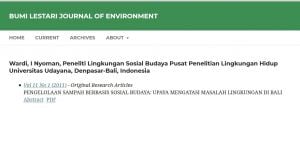
The study was conducted in 2008 in Gianyar, Badung and Denpasar. The goal was to inventory and describing the residential waste management system conducted by the Balinese, and to identify the various problems faced in community-based waste management. To achieve these objectives was done by gathering data through observation, interview and literature study. The collected data were analyzed by descriptive qualitative. The results showed that some of the constraints faced by village institution in waste management, namely: 1) low level of public awareness, 2) the difficulty of getting land for a depot for waste management; 3) the condition of garbage in front of the house (TPS) are not disaggregated (organic and inorganic waste mixed), 4) waste transportation time is not correct 5) lack thrasher; 6) marketing of compost that is not smooth and very limited; 8) waste processing workers’ health problems, and 9) the limited presence of operational funding for waste management. Socio-cultural-based waste management can be done to actualize and enhance the role of traditional institutions (traditional village/
banjar) as its support the vision and mission of Tri Hita Karana; change the paradigm of the Balinese culture (cultural engineering) in waste management; actualization of cultural values and the sanctity of the environment (resource of vital nature) and area / sanctuary, reviving the tradition of mutual help to clean of the environment, promoting efforts to 3 R (reduce, reuse and recycle) waste of rural community residents; enhance the active role of housewives (PKK) in waste management, implementation of household and environmental management rules (waste) effectively through the mechanism of reward and punishment in the form of customary rules (awig-awig).






Enable comment auto-refresher